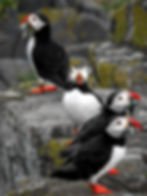

Puffin’s Fight for Survival

Is there such a thing as a bad photo of a puffin? With their colourful beaks filled with fish, they provide the perfect image of colour, personality and endearing cuteness. The puffins in these photos are Atlantic puffins and were captured on the Isle of May, one of Scotland's National Nature Reserves. Yet despite such reserves and efforts to preserve and protect these birds, puffins continue to show a rapid decline in numbers in recent years. Rising sea temperatures, fishing and pollution all have an impact on the species.

Puffins spend most of their lives at sea, coming to land only to breed and raise their young. During the breeding season, they return to the same mate every year, some staying together for over twenty years raising chicks, aka “pufflings”. Yet, as ocean temperatures rise due to climate change, the fish puffins rely on—such as sand eels—are becoming less abundant or moving to cooler waters. Human activities, including commercial overfishing, are depleting the same fish stocks. Without sufficient food, puffins struggle to raise healthy pufflings, and adult puffins are often forced to travel longer distances in search of sustenance. This can lead to breeding failures and declining populations in some regions.

Despite these challenges, public education campaigns, eco-tourism, and wildlife documentaries have increased awareness of the puffin’s plight. As people fall in love with these quirky birds, there’s a growing movement to support conservation efforts through donations and volunteer work. Continuing the efforts of public education is an important means of protecting these birds. Such efforts have helped put into effect marine protected areas to safeguard their feeding and breeding grounds, while in some regions, conservation groups are working to restore puffin breeding sites by creating artificial burrows and replanting grasses on cliffs.
As we face the growing challenges of climate change, puffins remind us of the beauty and fragility of nature. With collective action, we can ensure that these "clowns of the sea" continue to thrive for generations to come.







